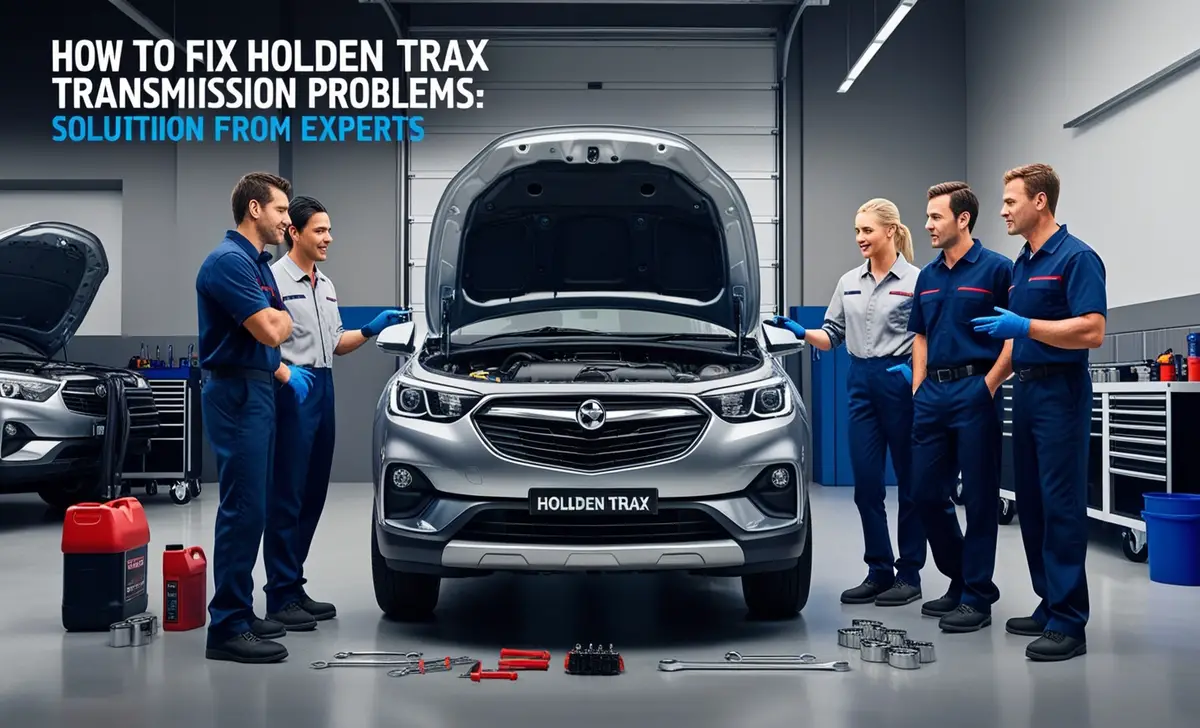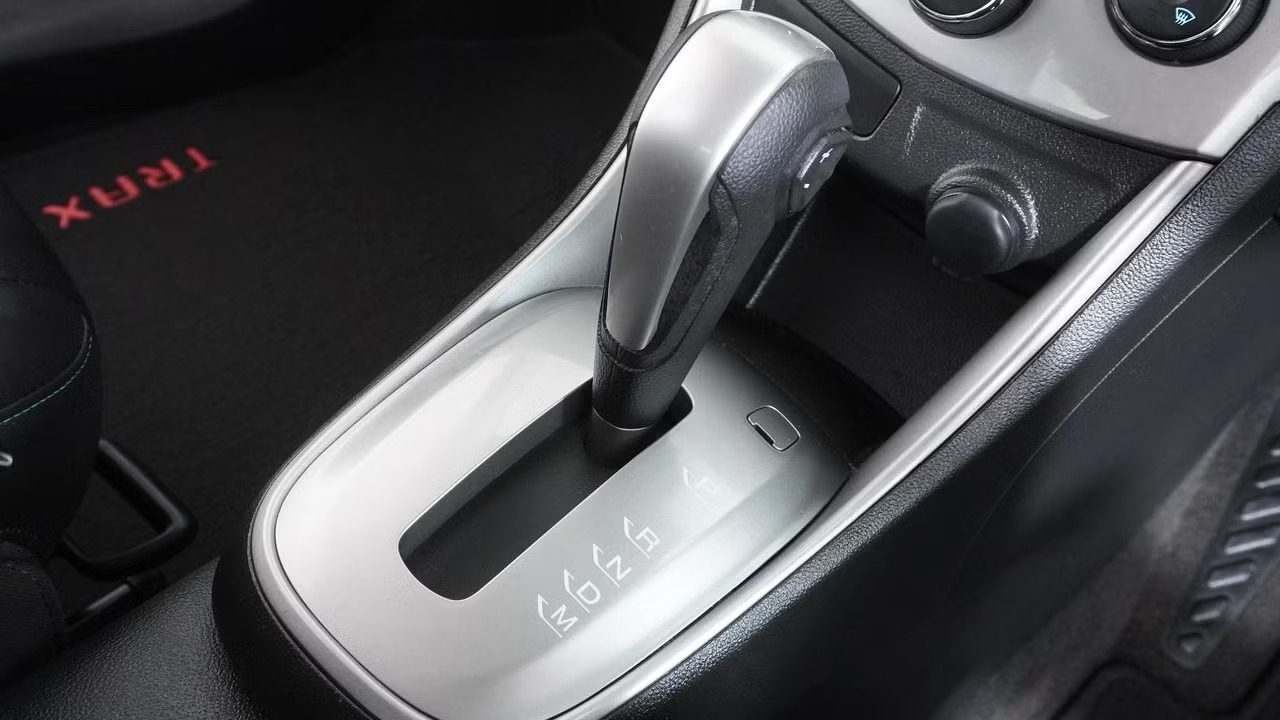The Holden TRAX has become a popular choice among car buyers in recent years, thanks to its compact size, sleek design, and affordable price tag.
However, like any vehicle, it is not immune to mechanical issues and problems that can arise over time. The Holden TRAX, like any vehicle, can encounter transmission issues over time.
Understanding the causes and solutions for these transmission problems is crucial for maintaining the health and longevity of your Holden TRAX. This guide will walk you through the steps to diagnose Holden TRAX problems. Troubleshoot, and fix common transmission issues to ensure your vehicle runs smoothly and efficiently.

Key Takeaways
- Common Issues: The Holden Trax faces issues with transmission, engine performance, electrical systems, and suspension.
- Transmission Problems: Slipping gears, delayed shifting, and strange noises are prevalent; regular maintenance is crucial.
- Maintenance Tips: Regular fluid checks, timely repairs, and professional diagnostics help prevent issues.
- Customer Support: Document concerns and communicate effectively with Holden customer service for resolutions. Proper care ensures a smooth and reliable driving experience for years.
About Holden TRAX
The Holden Trax is a compact SUV produced by the Australian automaker Holden. They first introduced it in 2013, and now popular for its stylish design and versatile features. The Trax offers a comfortable and spacious interior, making it suitable for both city driving and off-road adventures.
It has advanced safety technologies and modern connectivity options, ensuring a convenient and secure driving experience. The Holden Trax is available in different trim levels and engine options, allowing customers to choose the variant that best suits their preferences and needs.
What Are The Common Defects In Holden TRAX?

There are a few common problems and issues that have been reported by owners. One of the most prevalent issues is related to the transmission. Some owners have experienced rough shifting, hesitation, or even complete transmission failure.
This issue can be quite frustrating for owners, as it can affect the overall driving experience and lead to costly repairs. Common problems and issues with the Holden Trax include:
Transmission Issues:
Some owners have reported issues with the automatic transmission, such as rough shifting, slipping gears, or delayed engagement.
Electrical Problems:
Several complaints have been made regarding electrical issues in the Holden Trax, including malfunctioning infotainment systems, faulty wiring, and intermittent power-window failures.
Engine Performance:
Some owners have experienced engine-related problems, such as stalling, loss of power, or inconsistent acceleration. These issues could be attributed to fuel pump or fuel injector problems.
Suspension And Steering:
There have been reports of suspension and steering issues, including excessive noise, vibrations, or difficulty in maintaining proper alignment. These problems may require the replacement of components like shocks, struts, or control arms.
HVAC System:
A few owners have encountered issues with the heating, ventilation, and air conditioning (HVAC) system, such as inadequate temperature control, weak airflow, or complete system failure.
How To Fix Holden TRAX Transmission Problems: Solution From Experts

The Holden Trax, a popular compact SUV, has earned its fair share of acclaim in the automotive industry. However, like any vehicle, it has its fair share of problems. Potential buyers and current owners must know these issues and understand how they may impact their ownership experience.
One common problem reported with the Holden Trax is its transmission. Some owners have experienced issues with the transmission slipping, causing a loss of power and erratic shifting.
This can be frustrating and potentially dangerous, especially when driving at high speeds or in heavy traffic. Additionally, there have been reports of transmission failures requiring costly repairs or even complete replacements. Here are 5 steps to help you fix Holden Trax’s problems:
Slipping Gears
Slipping gears in the Holden Trax occurs when the transmission unexpectedly changes gears or struggles to stay in the correct gear. This issue can lead to a loss of power and poor acceleration. Causes may include low transmission fluid, worn-out gears, or a failing clutch. Regular maintenance and timely fluid checks can help prevent this problem.
Solution:
Experts recommend addressing slipping gears in the Holden Trax by first checking and topping up the transmission fluid to ensure it’s at the correct level and in good condition. If the issue persists, inspect for leaks and replace worn seals or gaskets.
Additionally, consider updating the vehicle’s software and resetting the transmission control module. For persistent problems, consult a mechanic to diagnose and repair any underlying issues, such as worn gears or a failing clutch.
Or Seek Professional Repair:
Expert car servicing can resolve the common issue of slipping gears in Holden TRAX. By addressing the transmission issue promptly, professionals can diagnose and fix the problem efficiently. Trusting experts to handle the transmission problem ensures a smooth driving experience and prevents further complications down the road.
Delayed Shifting

Delayed shifting is when there is a noticeable lag between the driver engaging a gear and the transmission responding. This can result in rough or jerky transitions between gears, affecting the vehicle’s performance and drivability.
Common causes include low or dirty transmission fluid, faulty sensors, or a malfunctioning transmission control module. We can resolve Holden TRAX transmission problems by addressing the issue of delayed shifting.
After undergoing car repair and inspections, the vehicle’s transmission, specifically the TRAX model, was fixed to ensure smooth operation at highway speeds. This solution was implemented after a thorough car review, aiming to enhance the overall performance and reliability of the Holden Trax.
Solution:
- Check And Replace Transmission Fluid: Ensure the fluid is at the correct level and in good condition; replace if necessary.
- Update Software: Install the latest transmission control software updates from the manufacturer.
- Inspect Sensors: Check for faulty sensors that might be causing the delay.
- Transmission Control Module (TCM): Reset or replace the TCM if it’s malfunctioning.
- Professional Diagnosis: Have a certified mechanic conduct a thorough inspection to identify and fix any underlying issues.
Strange Noises
Strange noises from the transmission, such as whining, clunking, or grinding, are indicators of potential problems. These noises can result from worn bearings, damaged gears, or inadequate lubrication. Ignoring these sounds can lead to more severe transmission damage.
It’s essential to have the vehicle inspected by a professional if unusual noises are detected. Upon investigating, car experts from Chevrolet TRAX advised that the Holden TRAX transmission issues may be resolved by diagnosing strange noises.
Offering car advice, they suggested a thorough inspection to identify the source of the problem. Additionally, they recommended addressing any potential transmission concerns promptly to prevent further complications with the Holden Cruze.
Solution:
Holden TRAX owners experiencing transmission problems should note any strange noises coming from their vehicle and inspect for any visible damage or leaks. Suppose the fluid level and quality appear to be fine.
In that case, the issue may be attributed to worn bearings or gears within the transmission system, which would necessitate a professional inspection and repair. It is essential to address these concerns promptly to avoid any further damage and ensure the smooth operation of the vehicle.
Owners are advised to consult with a qualified mechanic or dealership to accurately diagnose and resolve any transmission-related issues in their Holden Trax.
Warning Lights On The Dashboard

Warning lights on the dashboard, specifically the check engine light or transmission warning light, can indicate transmission issues. These lights are triggered by the vehicle’s onboard diagnostic system detecting problems such as overheating, low fluid levels, or component failures.
Addressing these warnings promptly by checking the error codes and seeking professional assistance can prevent further damage and costly repairs.
Solution:
When experiencing a Holden Trax transmission problem with warning lights on the dashboard, it is important to address the issue promptly. These warning lights, such as the check engine light, may indicate engine problems or an electrical problem.
Seeking assistance from an auto electrician can help diagnose and fix these issues efficiently. Various techniques are available to address Holden Trax transmission problems, particularly when warning lights on the dashboard illuminate.
- Check transmission fluid level to ensure it’s adequate.
- Inspect the transmission system for leaks or damages.
- Reset the transmission control module (TCM) to clear error codes.
- Consult a professional mechanic or dealership for comprehensive diagnosis and repair
Maintenance Tips To Prevent Future Problems
Holden is an exceptional company that understands the importance of proactive measures to prevent future problems.
With a keen focus on customer satisfaction and product quality, Holden recognizes that addressing potential issues before they arise is crucial to maintaining its reputation as a reliable and trustworthy brand. Here are some maintenance tips to prevent future problems with your Holden Trax:
- Regular Oil Changes: Ensure you follow the recommended oil change intervals as specified in your vehicle’s manual. This will help maintain proper engine lubrication and prevent potential issues.
- Check Fluid Levels: Regularly check and top up fluids such as coolant, brake fluid, and transmission fluid to ensure they are at the appropriate levels. This will help prevent overheating, brake failure, and transmission problems.
- Tire Maintenance: Keep an eye on the tire pressure and tread depth of your Holden Trax. Underinflated tires can decrease fuel efficiency and increase the risk of a blowout, while worn-out tires can compromise the vehicle’s handling and braking capabilities.
- Replace Filters: Regularly replace the air filter, fuel filter, and cabin air filter to ensure optimal engine performance and prevent contaminants from entering the vehicle’s systems.
Tips For Resolving Issues With Holden Customer Service

Holden Customer Service is familiar for its commitment to delivering exceptional service and support to its valued customers. When experiencing issues with Holden customer service, consider utilizing various fixing techniques for a satisfactory resolution.
These may include requesting repairs covered under warranty, emphasizing the importance of a good car, and discussing options such as heated front seats or a turbo upgrade for your Holden TRAX LTZ or TJ.
Communicate with the Holden dealer to explore solutions that address concerns with the rear seat or other aspects of the vehicle. TRAX for Resolving Issues with Holden Customer Service regarding Holden TRAX problems:
- Document All Communication
- Have Preparation & Stay Calm And Polite
- Clearly Explain The Issue
- Ask for A Case Reference Number
Whether it is addressing inquiries, resolving concerns, or providing product information, Holden’s customer service representatives are top-notch in meeting the diverse needs of their customer base.
Conclusion
The Holden Trax may have its fair share of issues. Proper maintenance and a proactive approach can easily resolve these problems. We can take steps to fix them and maintain the quality and performance of the vehicle.
By following the recommended steps on handling trax problems and seeking help from a professional mechanic, you can ensure that your trax runs smoothly and efficiently for years.
Remember to prioritize regular check-ups and promptly address any issues to avoid major complications. With proper care and attention, your Holden Trax can continue to be a reliable and enjoyable vehicle for everyday use.
Frequently Asked Questions
1.Is Holden TRAX Good On Fuel?
Yes, the Holden TRAX is popular for its fuel efficiency. With its efficient engine and lightweight design, the TRAX delivers good fuel economy, making it a cost-effective choice for those looking to save on fuel expenses.
2.What Engine Is In A Holden TRAX?
The Holden Trax typically comes with a 1.4-liter turbocharged four-cylinder engine. However, the engine has been remaining with some reliability issues. One common complaint among Holden Trax owners is a noticeable lack of power and poor acceleration.
3.What Is The Code Po171 On A Holden Trax?
The code P0171 on a Holden Trax indicates a problem with the fuel system, specifically a lean condition in bank 1. This means there is an imbalance in the air-fuel mixture, with an excess of air or a deficiency of fuel.
4.Is Holden Trax Discontinued?
As of now, it’s not officially yet. However, General Motors has announced plans to wind down Holden operations in Australia and New Zealand by 2021, which could lead to the discontinuation of the Trax and other Holden models.
5.How Should I Handle Transmission Issues When Driving A Holden Trax?
When experiencing transmission issues in a Holden Trax, it’s crucial to address them promptly. Check transmission fluid levels, inspect for leaks, and listen for unusual noises. If problems persist, seek professional diagnosis and repair to ensure safe driving and prevent further damage.
6.Does The Fuel Pump Control Module On A 2018 Chevy Trax Have To Be Programmed?
Yes, the fuel pump control module on a 2018 Chevy Trax must be programmed. This programming is necessary to ensure proper integration with the vehicle’s systems and optimal performance. It is typically performed by a qualified technician using specialized equipment.
7.Why Do You Need To Replace Your Holden Trax Head Gasket?
Replacing the head gasket in a Holden Trax is necessary if it develops leaks or fails. A faulty head gasket can lead to overheating, loss of compression, and engine damage. Replacement ensures proper sealing and prevents further issues.
8.What Are The Key Stats Specs Of Holden Trax Engine?
The Holden Trax engine typically features a 1.4-litre turbocharged inline-4 or a 1.8-litre inline-4, delivering around 138-153 horsepower and 148-177 lb-ft of torque. It comes with a 6-speed automatic transmission, offering a balance of power and efficiency.
9.When Should You Have Your Holden Trax Inspected For Potential Problems?
It’s recommended to have your Holden Trax inspected for potential problems annually or every 12,000 miles, whichever comes first. Regular inspections help identify issues early, ensuring the vehicle’s safety and reliability.
10.What Are The Top Complaints About Holden Trax?
Common complaints about the Holden Trax include transmission issues such as rough shifting or failure, engine problems like stalling or loss of power, and interior quality concerns like rattling noises or malfunctioning electronics.
11.What Are The Common Defects In Holden Trax?
Common defects in the Holden Trax include faulty transmissions leading to rough shifting or failure, engine problems such as oil leaks or premature wear, and interior issues like malfunctioning electronics or poor build quality. Regular maintenance and prompt repairs can mitigate these issues.
12.When Do Holden Trax Thermostats Need To Be Replaced?
Holden Trax thermostats typically need replacement if they fail to open or close properly, causing engine overheating or poor heating performance in the cabin. Consider replacement for the stuck open or closed thermostat during routine maintenance every 50,000 to 100,000 miles.
13.What Is The Fuel Capacity Of The Holden Trax?
The Holden Trax typically has a fuel capacity of around 12.2 gallons (46 liters). This fuel capacity provides an adequate range for city and highway driving without requiring frequent refuelling stops.
14.How Much Storage Space Does The Trax Have?
The Trax offers versatile storage options, including an approximately 18.7 cubic feet cargo capacity behind the rear seats. With the rear seats folded down, the cargo space expands to up to 48.4 cubic feet, providing ample room for luggage, groceries, or other cargo.
15.What Are Some Of The Chevy Trax Turbo Problems?
Some common turbo-related problems in the Chevy Trax include turbocharger failure, oil leaks from the turbo seals, and issues with turbo boost control. If not addressed promptly, these problems can reduce engine performance, drivability concerns, and potential engine damage.
16.Which Years Of Used Chevy Trax Cars Are Most Reliable?
The most reliable years of used Chevy Trax cars are those from recent model years, particularly 2019 and newer ones. These models may have fewer reported issues and benefit from improvements in design and manufacturing processes, offering buyers enhanced reliability and peace of mind.